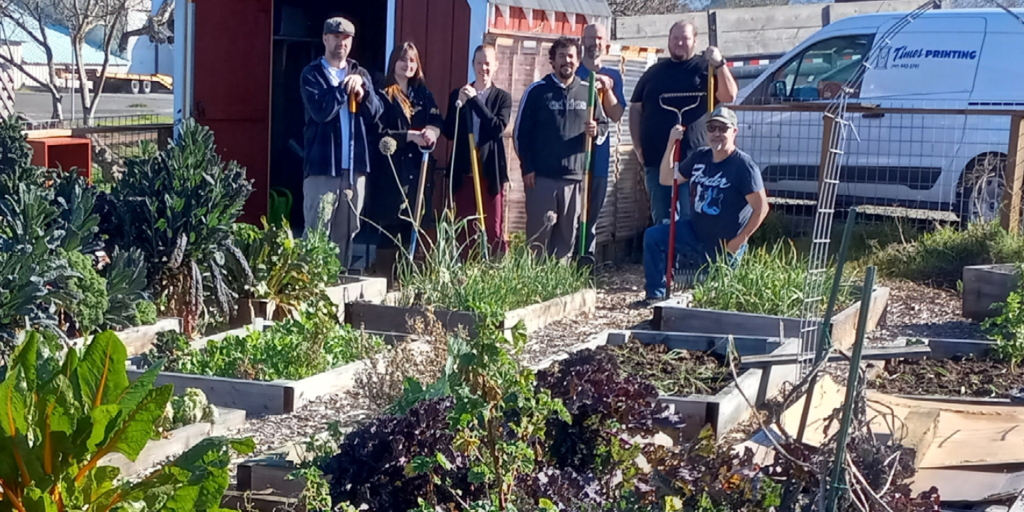Area companies help the environment, local community, and their employees through community gardening.
by Christi Dawn Nash, Cooperation Humboldt

Cultivating small gardens in suburban areas beautifies cities, provides fresh produce, increases food access, reduces dependence on industrial agriculture, and helps to absorb harmful carbon emissions. Community gardens also bring folks together in a healthful activity which nurtures cooperation and altruism. Restaurants, hotels, hospitals and schools may recognize that growing fresh food supports their economic interests and social goals. On the North Coast, non-food businesses are planting seeds of opportunity, too!
Times Printing Company: Pandemic-Inspired Growth
Times Printing is a local family-owned business founded in 1854. Today, it provides offset, digital and variable data printing, mailing services, bindery procedures, and other print processes for books, brochures, newsletters, labels, and more – all entirely powered by renewable energy.
When businesses began closing during the rise of COVID-19 in March 2020, Times Printing’s owner and production manager, Seth Strope, and its business manager, Lynn Dugaw, felt an urgency to utilize the company’s resources fully to provide fresh food through a community garden for employees. Seth and Lynn had an existing interest in permaculture and the pandemic was the final push they needed to develop a gardening space on the company’s property near the corner of First and T Streets in Eureka.
The Times Printing garden provides an opportunity for team building outside of the regular work context and feeds participants and their families while providing hands-on education on the process of growing fruits and vegetables. Neighbors enjoy the attractive green space on their daily walks, too.
Lynn says, “Having a garden at work has added a lot of enjoyment to my job. I have my own planter box to grow vegetables in and everyone else has been generous in sharing what they grow. It’s fun taking home food from the garden to eat with my family. The garden is also a peaceful place to spend time in.”
Seth continues to find inspiration to grow fresh produce in his favorite quote by Australian biologist and permaculturist Bill Mollison: “Though the problems of the world are increasingly complex, the solutions remain embarrassingly simple.”
Green Diamond Resource Co.: A Pumpkin Patch Expands
Green Diamond Resource Company is a fifth-generation family-owned forest products company that is certified by the Forest Stewardship Council (FSC) while also complying with state forest practice rules.
In the Fall of 2017, Green Diamond created a pumpkin patch and grew 300 pumpkins for team members’ families. Senior Operations Coordinator Linda Herron recalls, “We saw that the local pumpkin patches were closing and thought, ‘We could do that!’ I talked to a few of my colleagues, they all thought it was a great idea.” The following year, the company expanded the space to include a 100’ x 50’ vegetable garden, which now provides an abundance of fresh food for employees’ plates as well as augmenting their neighbors’ meals through a partnership with the Blue Lake food pantry. Green Diamond also hosts Blue Lake Elementary School children each year, sending each student home with a pumpkin.
The fresh vegetables grown at Green Diamond’s garden support employees’ healthy eating habits, and time spent in the garden supports cross-department collaboration, according to Botany Supervisor Gabe Cashman. “When an individual goes through the paces of growing food from seed there is certainly an increased appreciation and respect for high quality produce,” he explains. Linda adds, “It’s fun to meet and get your hands dirty with employees you don’t normally work with.”
Tips for Starting a Company Garden
Our friends from Times Printing and Green Diamond have shared their struggles and solutions to support others on their journey.
Seth and Lynn from Times Printing advise starting small, focusing on building soil and growing what you like to eat. They initially prepared the garden space by layering used cardboard, mulch and wood chips to suppress aggressive bindweed which can interfere with food crops. They are currently developing an efficient harvesting system via an interactive online list of garden beds to avoid food waste and beds sitting empty between crop rounds.
At Green Diamond, Gabe recommends planning what to plant and being realistic about what produce is desired by employees and food banks; he learned this lesson the hard way after overplanting some varieties each year. Logging Operations Administrator Will Devenport relates that their small setbacks have been overcome by infrastructure improvements, like alternative forms of communication between departments, flexible work days, and assigning projects to individuals based on their own interests; this can include composting, herb gardening, garden layout and more. Will continues, “I would suggest networking around the county to local businesses for assistance in making a community garden happen, either through donations or wholesale. For example, our 2022 season has started off with much needed soil amendment donations from local distributors Fox Farm, Wes Green, and Royal Gold.” Linda reiterates her co-workers’ advice, “Communication is important. Make sure there is a plan and stick to it.”